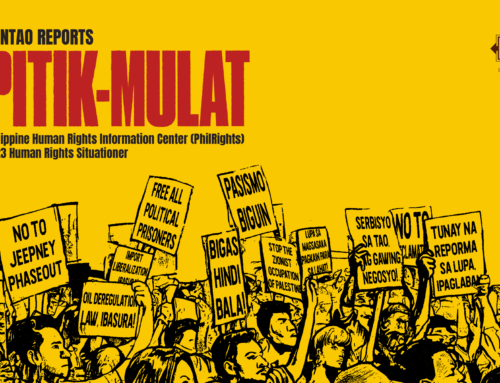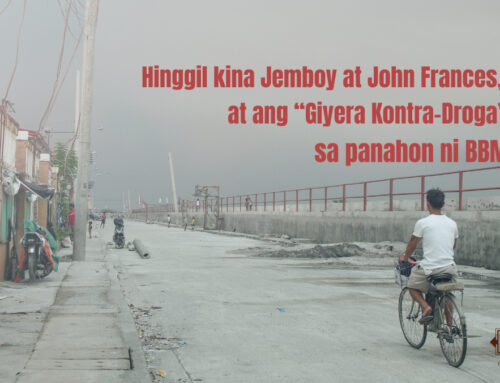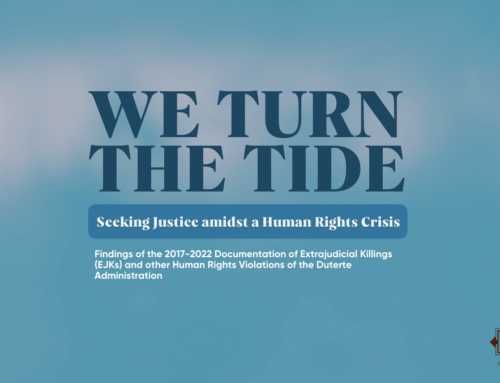by PhilRights Staff
Welcome to HR Insights, a weekly roundup of human rights news in the Philippines. This week…
Police not immune to “War on Drugs” impact
SunStar Cebu reported that a police officer allegedly protecting illegal drug operations in Cebu was killed in a shootout following a buy-bust operation.
In a June 11 press briefing, Philippine National Police (PNP) chief Oscar Albayalde highlighted the Mandaue City operation that led to the death of Senior Inspector Raymund Hortuzuela as part of the police force’s internal cleansing operations.
SunStar Cebu also quotes Albayalde as saying: “We will not rest. Kung yung war on drugs natin (Under our war on drugs), we will not stop until the last trader or user ay mapakulong natin (are sent to jail), we will not also stop in our organization until the last erring policeman will be dismissed or discharged from the service.”
Meanwhile, Manila Bulletin reported that 24 police chiefs in the MIMAROPA (Mindoro, Marinduque, Romblon, Palawan) region were sacked for underperforming in the PNP’s anti-illegal drug campaign.
Regional Police Director Chief Supt. Emmanuel Luis Licup was quoted as saying that the 24 sacked police chiefs were found to have “failed to meet the requirements set on the number of accomplishments in their anti-illegal drugs operations.”
The police chief also warned the remaining police commanders that should make their anti-drug campaigns more aggressive if they want to keep their posts. The Manila Bulletin story also noted that MIMAROPA has lowest incidence of drug proliferation and is one of the least bloody regions in the ongoing “war on drugs.”
It seems that the police chief would rather needlessly intensify an anti-illegal drug campaign in a region that does not need it, making the cure more deadly than the poison. Such intensification without real proof of necessity will only victimize bystanders that the provincial police need to fill their drug suspect quotas.
Duterte now calls for arming barangay captains to assist in “War on Drugs”
Duterte wants barangay chiefs to assist the national government in its already bloody “war on drugs” or else be suspended, dismissed, or charged with “gross neglect of duty,” as ABS-CBN reports. Duterte has also proposed arming barangay captains, though he clarified that the police would still lead anti-illegal drug operations.
That these are suggestions coming from the commander-in-chief is no small matter. Indeed, arming barangay captains who have very little training, if at all, in the rules of engagement is incredibly irresponsible.
AFAD: Nearly two thousand instances of enforced disappearances from 1983 to 2018
The Asian Federation Against Involuntary Disappearances (AFAD) called on the administration to put an end to enforced disappearances that followed the so-called war on drugs, ABS-CBN has reported.
The organization counted 1,993 documented cases of enforced disappearances from the period of 1983 to May 2018. Forty of these cases were reported in the first two years of the Duterte presidency according to the organization Families of Victims of Involuntary Disappearances (FIND).
FIND also points out that some victims of extrajudicial killings were first abducted before being found dead.
PNP to stop presenting arrested suspects to the media
The Manila Bulletin reports that the Philippine National Police will no longer present arrested suspects to the media in order to comply with an old PNP memorandum written by former PNP chief Jesus Verzosa dated October 2008. The current PNP chief Albayalde said that the practice violates the constitutional right to the presumption of innocence.
While definitely a welcome move, this raises the question of why it took the PNP an entire decade to observe its own memorandum. By waiting this long, scores of individuals have already had their reputations harmed and right to presumption of innocence violated.
A Philippine Star report quotes Human Rights Watch (HRW) as saying that the move will be no more than “cynical, self-serving window-dressing” if the police would not end the systemic abuses that are being committed under the guise of the anti-illegal drug campaign.
Another priest, another journalist killed
The Philippine Star reports on the alarming spate of killings, the latest being that of a priest and a journalist.
Father Richmond Nilo of Nueva Ecija was gunned down on June 11 before officiating a mass in the town of Zaragoza. Fr. Nilo is the third priest to be killed under Duterte. Journalist Dennis Denora from Davao del Norte was shot on June 7. He is the 11th journalist to be killed since Duterte became president.
These deaths have prompted Carlos Conde, Human Rights Watch Asia Division researcher, to issue the following statement to the Philippine Star: “These killings, alongside the thousands of deaths in the ‘drug war,’ are grim reminders of the vulnerability of the poor and those who speak out for their rights and against the deadly extrajudicial violence that Philippine authorities are apparently unwilling or unable to stop or provide accountability for.”
Rights group Karapatan blames the culture of impunity for these murders and expresses doubts that masterminds will ever face justice, Davao Today has reported.
There have been 23,518 homicide cases under investigation since President Duterte took office, which translates to 33 persons killed a day, as a Rappler report shows. The PNP recorded this figure from July 1, 2016 to June 11, 2018. Rappler also noted that while crimes against persons and property dropped, killings increased.
MUST READ: Rappler looks into the “record history” feature of the National ID system
Rappler this week came out with an in-depth look into questions surrounding the adding of a “record history” to the National ID system that is only Duterte’s signature away from becoming law.
As it turns out, the record history of the ID-holder will record details of authentication requests using the ID and a log of information disclosures of third parties. The article includes a warning from privacy lawyer Jam Jacob of the Foundation for Media Alternatives that the record history could be used as a comprehensive surveillance system.








